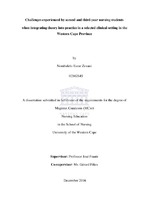Challenges experienced by second and third-year nursing students when integrating theory into practice in a selected clinical setting in the Western Cape Province
Abstract
Background: Nursing as a profession is based on firm knowledge, values, clinical skills and attitudes. In the current dynamic healthcare systems, all nurses are challenged to be insightful and have robust clinical reasoning and psychomotor skills in order to integrate theory into practice. Therefore, they need to be accountable in ensuring that they perform optimally to meet the extensive demands of clinical settings. Theory-practice integration is a major element that sustains quality and drives best nursing practice. One of the barriers to theory-practice integration is the gap between theory and practice in nursing education. Therefore, if sound theory is the basis for understanding the reality of the clinical setting, then every effort should be made to reduce the gap between theory and practice. Aim: The aim of the study was to explore and describe the challenges experienced by second and third-year nursing students when integrating theory into practice in a selected clinical setting in the Western Cape. Method: A qualitative approach, using an explorative, descriptive and contextual design, was employed. The target population of the study was the second and third-year nursing students who were registered for the Bachelor of Nursing Degree in the academic year of 2016. The selected non probability sample comprised of 14 participants. Data were collected using semi-structured focus group interviews, with an interview guide and probing to gain detailed information during the process of data collection. Interviews were audio recorded to ensure that no information would be lost and the researcher could review it when necessary. The content analysis method was used to analyse the data. Permission to conduct the study using the nursing students was obtained from the registrar of the University of the Western Cape and the HOD of Son. The research ethics committee granted ethics approval related to the study. All participants were involved in the study on a voluntary basis. Informed consent and focus group confidentiality binding forms were completed by participants to ensure confidentiality. Results: Four themes emerged from the findings namely: Theory verses practice, lack of role models, inadequate support structures and communication. The study highlighted that nursing students still experience a challenge with integrating theory into practice in the clinical settings. In addition the study highlighted that clinical guidance from the preceptors a crucial role in the professional development of students. The results of the study also showed that a new structure of facilitating nursing students in clinical settings must be in place. This structure should include proper orientation and supervision of the nursing students. The preceptors who facilitate clinical guidance must be equipped with the necessary knowledge and skills to ensure that they are able to facilitate and monitor the competence of the nursing students. Conclusion: Clinical nursing education is vital and indispensable in nursing education. It is very complex consisting of many aspects and situations, which can be challenging and demanding for a nursing student. Due to its complexity, it is essential for nursing students to be exposed to a variety of real life situations within their training in order to better prepare them for quality practice. Nursing students therefore require sufficient support from the clinical preceptor and the nursing educators, to acquire the necessary skills, knowledge and attitude to perform nursing duties with competence, when placed in the clinical settings. This calls a lot of attention from the higher learning institutions and the clinical settings to have standardised goals and expectation for the students, providing quality clinical accompaniment that will socialise the nursing student optimally in the profession and attempt to bridge the gap between theory and practice.

